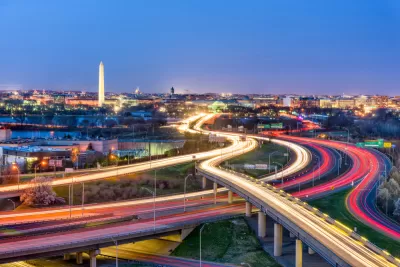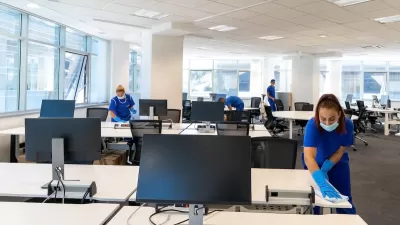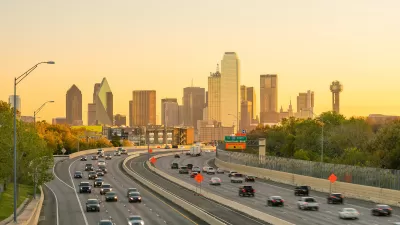Federal workers are pushing back on a return to the office, citing the environmental benefits of eliminating daily commuting.

After the U.S. House of Representatives passed a bill calling for federal employees to return to their physical offices this month, the largest union of federal employees is pushing back, saying that remote work is healthier for the planet. According to a piece by Maxine Joselow in The Washington Post, “the American Federation of Government Employees points to research showing that telework curbs climate pollution caused by commuting in gas-powered cars.”
For others, like D.C. Mayor Muriel Bowser, mandating a return to the office is one way to revitalize Washington, D.C.’s downtown, which thousands of businesses have fled since the start of the pandemic. But with over 80 percent of U.S. commuters driving to work in private vehicles, reducing trips to work could significantly impact carbon emissions in the transportation sector. According to Gregory Keoleian, director of the University of Michigan’s Center for Sustainable Systems, one-quarter of federal employees switching to remote work could reduce emissions by 750,000 metric tons of carbon dioxide annually.
FULL STORY: Telework is better for the planet, federal union argues

Planetizen Federal Action Tracker
A weekly monitor of how Trump’s orders and actions are impacting planners and planning in America.

Maui's Vacation Rental Debate Turns Ugly
Verbal attacks, misinformation campaigns and fistfights plague a high-stakes debate to convert thousands of vacation rentals into long-term housing.

Restaurant Patios Were a Pandemic Win — Why Were They so Hard to Keep?
Social distancing requirements and changes in travel patterns prompted cities to pilot new uses for street and sidewalk space. Then it got complicated.

In California Battle of Housing vs. Environment, Housing Just Won
A new state law significantly limits the power of CEQA, an environmental review law that served as a powerful tool for blocking new development.

Boulder Eliminates Parking Minimums Citywide
Officials estimate the cost of building a single underground parking space at up to $100,000.

Orange County, Florida Adopts Largest US “Sprawl Repair” Code
The ‘Orange Code’ seeks to rectify decades of sprawl-inducing, car-oriented development.
Urban Design for Planners 1: Software Tools
This six-course series explores essential urban design concepts using open source software and equips planners with the tools they need to participate fully in the urban design process.
Planning for Universal Design
Learn the tools for implementing Universal Design in planning regulations.
Heyer Gruel & Associates PA
JM Goldson LLC
Custer County Colorado
City of Camden Redevelopment Agency
City of Astoria
Transportation Research & Education Center (TREC) at Portland State University
Jefferson Parish Government
Camden Redevelopment Agency
City of Claremont





























